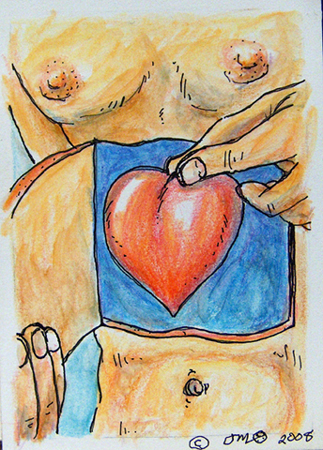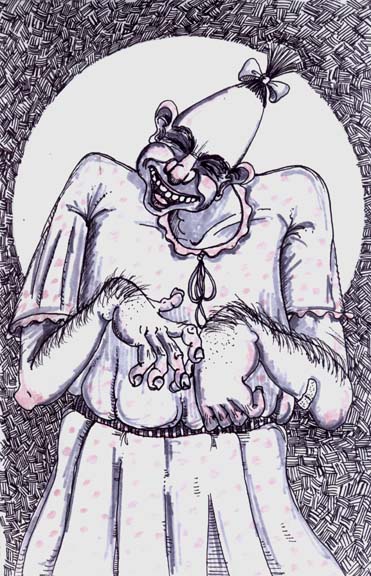~ Valentines' X 5 Give Away~
For Valentines Day~3 people will win a set of 5 tiny Valentine Cards! plus two more- read details below!
How to sign up?- Just comment below! (I love to read comments!) sign up as often as you want
- (Please add the next number in front of your comment) #1 ____name or comment____
- winners chosen through Random.org
- tell a friend! The 100th person to sign up for my blog wins a set of 5 tiny Valentines and the person that told them to sign up gets a set, too! we are at 95! (make sure you leave a way for me to contact you or check back on Feb 5th
- winners announced Feb 5th! (Just in time for Valentines Day ; )

Although the line between shame and guilt is sometimes blurred, the two differ clearly: guilt points to wrongdoing, whereas shame is the feeling of disgrace. In some communities it is shame that determines people’s behavior, in others it is guilt; hence the division of societies into two groups. In the previous post, I retraced the paths on which language historians hoped to find the root of the Germanic word for “shame,” and we saw how little they know about it (from being uncovered and exposed? from the “scanting” of honor? or was there a more direct way from private parts—so again exposure—to shame?). Guilt, one would think, will be more transparent, for guilt is a legal, rather than moral, category, but look up this word in almost any dictionary, and you will read: “Of unknown origin.” Even entries on shame, a word of rare obscurity, are more informative.
The first citations of guilt in the OED go back to the end of the 10th century, that is, to the Old English period. At that time, the word was spelled gylt and pronounced like German Gült. The OED states that no “equivalent forms” are known in any other Germanic language. This statement should be taken with a grain of salt, for German offers an exact equivalent, namely Gült (from Gült), though in extant texts it does not predate the 13th century. Gült(e) designated a specific tax levied on people in the Middle Ages. The German word provides less help that we need, but it has been around for a long time and its origin poses no problems: it is related to the verb gelten “pay.” Taxes exist to be paid. The English cognate of gelten is yield. However, a formidable obstacle prevents us from interpreting guilt as something to be yielded: the noun should have become guild (or yield); final t in guilt has no explanation.
Guild is a legitimate English word. It seems to have come to English from northern German (gilde) or Dutch. Some details remain obscure, but they won’t interest us here. Suffice it to say that a guild probably meant an association of persons contributing to a common object. Since guilt appeared in English long before guild, its pronunciation has nothing to do with an attempt to stay away from the newcomer (such cases are not too rare, for, although homonyms do not endanger communication, occasionally words choose to keep their distance from obtrusive neighbors): it always ended in -t. As regards the meaning of guilt, the OED appears to be a bit too harsh in its assessment. The earliest senses of Old Engl. gylt were “offence; crime; responsibility.” They are not incompatible with the idea of paying the price for a transgression. The OED says (I have expanded the abbreviations): “From the fact that Old Engl. gylt renders Latin debitum in the Lord’s Prayer and in Matt. XVIII. 27, and that is gyltig renders debet in Matt. XVII. 18, it has been inferred that the substantive [noun] had a primary sense ‘debt’, of which there seems to be no real evidence….” All this is true, but, if Engl. guilt had d at the end, the semantic difficulties would not have deterred anyone from comparing it with yield.
Sometimes, when sounds do not match, the idea of borrowing saves the day. Yet nothing supports the suggestion that Old Engl. gylt, a noun recorded several hundred years prior to its German “equivalent,” came to Britain from the continent, the more so because, as the OED points out, the ancient meanings of the two words do not overlap (it is “crime” in English and “tax” in German). One could fantasize that in the 9th or 10th century northern Germans had gylt “payment; tax” and that it was carried to the land of the Anglo-Saxons, where it changed its meaning to “crime,” with the only vestige of the original sense “payment; that which is due; debt” preserved in ritual texts (the Bible). Not only does the absence of this word in Old High German texts make such a hypothesis improbable. Phonetics also militates against it. The German language of that period lacked a vowel rendered in writing by Old Engl. y and by Modern German u with the umlaut sign.
To nonspecialists such an infinitesimal detail as t versus d may seem sheer pedantry, but the situation is familiar: “For want of the battle, the kingdom was lost,/ And all for the want of a horseshoe nail!” Etymology (a vulnerable kingdom) approached something that can be called science only when it began to pay attention to phonetic correspondences. Every time this criterion fails us, we should either explain the deviation or concede defeat. German t corresponds to Engl. d: compare German reiten and Engl. ride. There remains a feeling that guilt and yield are related despite the fact that we failed to break the magic circle around the English noun, but it will remain just this: a feeling with a bitter aftertaste. Incidentally, the first consonant is not a problem: g- instead of y- can be ascribed to the northern norm, as in the verbs get and give, which, if they had developed as expected, should have “yielded” yive and yet, but, when the entire structure collapses, who will rejoice at the sight of a relatively unimpaired roof?
We can only seek comfort in the fact that the cause of the odd spelling (gui-) is known. In today’s English the reading of g before i and e is always a problem. One should tread gingerly with all kinds of gills, and never assume that one knows how Mr. Gilson pronounces his name. Gill of Jack and Jill’s fame had to change the spelling of her name to avoid misunderstanding. The spellings gui- and gue- were introduced on the French model to clarify matters. Now gest- in digest, gestation, and gesticulation won’t be confused with guest. Right? Well, not quite. English spelling has never been reformed consistently. As a result, we struggle with get and jet, gig and jig, give and gyve (y is a redundant letter having the same value as i), and even guilt coexists with gilt; the last two words are homophones but not homographs. Thus we will live on with a sense of shame that an army of learned linguists has not solved the etymological mystery of guilt. But this is not their fault: something is really wrong with this word.

Anatoly Liberman is the author of
Word Origins…And How We Know Them as well as
An Analytic Dictionary of English Etymology: An Introduction. His column on word origins,
The Oxford Etymologist, appears here, each Wednesday. Send your etymology question to
[email protected]; he’ll do his best to avoid responding with “origin unknown.”
ShareThis
Give your heart away, don’t hide it in some lonely place.
Bring it out into the light of day and put a smile upon your face.
Storing it on the shelf may keep it safe from harm.
But finding things to that stir the self will keep it much more warm.
Sharing life of wonderment and looking with open soul
will fill you with astonishment at what wonders you behold.
Bring all your friends along for the ride, a merry way to give.
Give, don’t keep it locked inside, don’t worry it may be broken, just let it live.









I did this drawing a few months ago and never posted it. So, it makes its world premiere right here on SFG!
In between website challenges, I'll do a drawing on my own. Usually, it is a subject I just want to draw. Here is a character inspired by Schlitzie from the 1932 movie Freaks.

joshpincusiscrying












Leave a way for me to contact you if you win or check back often to see if you are the winner!
I LOVE your new Sleeping Fairy Note cards, Becky.
What do I love about gardens? The anticipation after you've planted a seed! The delight of watching it grow and bloom! The feeling you get from just admiring God's handiwork! It's amazing!
Thanks for the chance to win your new cards, and for your generosity!
Blessings!
Oh, I love gardens, the palette of colors, the textures, the fragrances, all the amazing petals, like jewels... just fills my heart and makes it sing! I also like getting my hands dirty and helping my garden grow, its very satisfying, anchoring work, and I'm teaching my children about gardening too, and nature study, we take our pencils and papers outside and draw the flowers, leaves, birds, etc. Passing on the love.
Love your Sleeping Fairies, so peaceful. Thanks for offering these cards Becky, they will make someone very happy!
I love the peaceful quiet of gardens, the smells, the colors, the quiet bee bumping around the flowers. And I love that you always find something different every time you visit. (^_^) I'm at Brikko Hayashi on FB.
I love the garden for it's dew drops in the early morning,
For the fresh scents of lush in the noon,
And the peaceful tranquility as the blooms sleep at night.
The garden is where all things magical are born.
I love how the gardens only bloom and flourish under great tender care by the sun and drizzles of water by the rain. Nature at it's peak
I love how the garden represents life in it's own small manner. Always flourishing and wilting only to flourish again with the changing seasons. It gives hope
I love the gardens because it's the playground of fairies, a place where magic reigns free. I would always go as a little girl. This post has reminded me of a wonderful childhood
I love the gardens because that's the place my granma would open up to me and told me stories of her childhood
I love all the colors and scents in a garden and the possibilities of seeing so many wonderful blessings of nature--butterflies, birds, delicate blossoms, ladybugs, dragonflies etc.!
[email protected]
I love to watch the bumble bees buzzing with their fuzzy bottoms on all my flowers, especially the foxgloves. Flowers always make me smile. LOVE your cards as ever, nice to have found you on facebook.
Catherine x